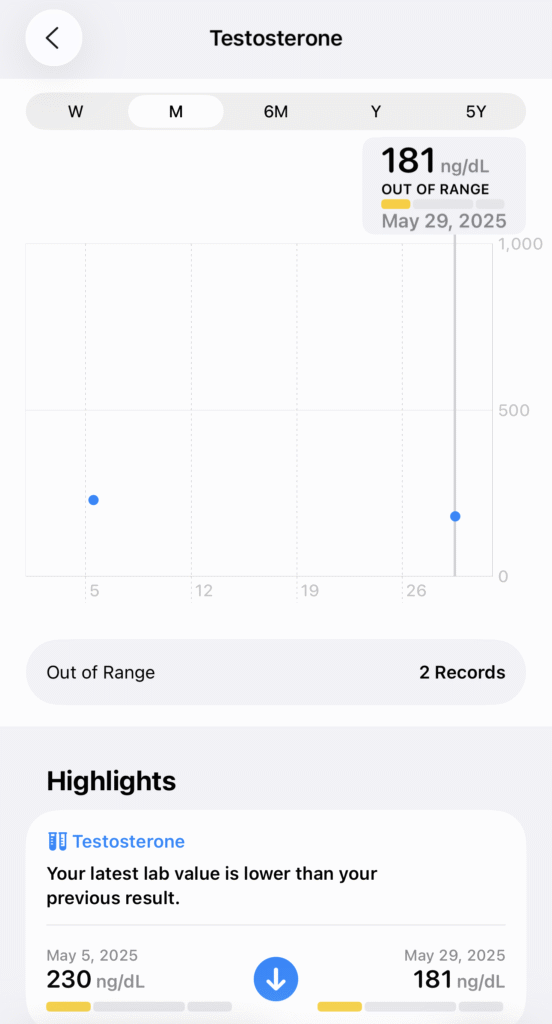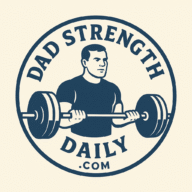Your testosterone doesn’t have to crash just because you hit the big 5-0.
If you’ve noticed decreased energy, stubborn belly fat, or less motivation in the gym, declining testosterone might be the culprit. While testosterone naturally decreases about 1% per year after age 30, many men experience steeper drops due to lifestyle factors we can actually control.
Before you consider testosterone replacement therapy (TRT), there are proven natural strategies that can help optimize your body’s own testosterone production. Here’s what actually works, backed by science.
1. Prioritize Deep Sleep (The 8-Hour Testosterone Factory)
Your body produces most of its testosterone during deep sleep phases. Studies show that men who sleep less than 5 hours nightly have testosterone levels 10-15% lower than those getting 7-8 hours.
Action steps:
- Maintain consistent sleep and wake times (even on weekends) — I find this crucial and actually easy to do, following the old “Sleep when the baby [kids] sleeps”
- Keep your bedroom cool (65-68°F) and completely dark
- Stop screens 1 hour before bed if you can. For me this is a work in progress.
- Consider magnesium glycinate or threonate (400mg) 30 minutes before sleep
2. Lift Heavy Things (Compound Movements Rule)
Resistance training is one of the most powerful testosterone boosters available. But not all workouts are created equal. Compound movements using 75-85% of your max weight produce the biggest hormonal response.
The protocol that works:
- Focus on squats, deadlifts, bench press, and rows
- 3-4 sets of 6-8 reps at challenging weights
- Rest 2-3 minutes between sets
- Train 3-4 times per week maximum (recovery is crucial)
Research shows this approach can increase testosterone by 15-20% within 8 weeks.
3. Eat Fat (Yes, Really)
These days there are so many fad diets out there that it’s hard to choose. I believe in a balanced diet high in protein. Be careful that low-fat diets are testosterone killers. Your body needs dietary fat to produce hormones, and studies consistently show that men eating less than 25% of calories from fat have significantly lower testosterone.
Testosterone-friendly fats:
- Grass-fed beef and lamb
- Wild-caught salmon and sardines
- Pastured eggs (eat the yolks!)
- Avocados, olive oil, and nuts
- Coconut oil for cooking
Aim for 30-35% of your daily calories from healthy fats.
4. Master Your Stress (Cortisol is Testosterone’s Enemy)
I always hate the advice “just avoid stress” — it’s not easy to achieve with a challenging job, kids and everything that’s going on in the world. However, chronic stress elevates cortisol, which directly suppresses testosterone production. It’s not just “feeling stressed” – physical stressors like overtraining, poor sleep, and inflammatory foods all spike cortisol.
Stress-busting strategies:
- Practice deep breathing for 10 minutes daily
- Take walks in nature (seriously, it works)
- Limit high-intensity cardio to 2-3 sessions per week — try to focus more on Zone 2 cardio (as Peter Attia preaches)
- Many folks suggest adaptogenic herbs like ashwagandha (e.g. 600mg daily) — for me this didn’t help and just gave me headaches, but others seem to have success.
5. Get Strategic Sun Exposure
Vitamin D isn’t just a vitamin – it’s a hormone precursor. Men with vitamin D levels above 30 ng/mL have significantly higher testosterone than those below 20 ng/mL.
The vitamin D optimization plan:
- Get 15-30 minutes of midday sun on large skin areas — I find just sitting/walking in sun for a little bit incredibly relaxing
- If supplementing, take 2,000-4,000 IU of vitamin D3 with K2
- Test your blood levels annually (aim for 40-60 ng/mL)
- some people swear by special SAD lights or light therapy boxes in winter months — I haven’t gone that far.
6. Time Your Carbs Right
Carbohydrates aren’t the enemy, but timing matters. Very low-carb diets can actually lower testosterone, while high-carb diets increase cortisol and insulin resistance.
The sweet spot approach:
- Eat 100-150g of carbs daily from whole food sources
- Time most carbs around your workouts
- Focus on sweet potatoes, rice, oats, and seasonal fruits
- Avoid processed sugars and refined grains
7. Consider These Proven Supplements
While supplements aren’t magic bullets, certain nutrients have solid research backing for testosterone support:
The evidence-based stack:
- Zinc (15-30mg daily): Essential for testosterone production — I get this in my multivitamin
- Magnesium (400-600mg): Often deficient in active men
- Vitamin D3 (2,000-4,000 IU): As discussed above
- Creatine (5g daily): May boost DHT, a potent testosterone metabolite
- Ashwagandha (600mg): Reduces cortisol and may increase testosterone by 17%
The 90-Day Challenge
Here’s your action plan for the next 90 days:
Week 1-2: Focus on sleep consistency and start strength training Week 3-4: Dial in your nutrition with adequate healthy fats Week 5-8: Add stress management techniques and optimize vitamin D Week 9-12: Fine-tune with strategic carb timing and evidence-based supplements
When Natural Isn’t Enough: The TRT Conversation
Let’s be honest: these natural strategies work for many men, but not all.
While lifestyle optimization should always be your first line of defense, some men have underlying hormonal dysfunction that can’t be fixed with diet, exercise, and supplements alone. This isn’t a failure – it’s biology.
Consider getting comprehensive hormone testing and discussing TRT if:
- You’ve consistently applied these strategies for 6+ months with minimal improvement
- Your total testosterone is below 300 ng/dL (or free testosterone is low despite normal total T)
- You have severe symptoms significantly impacting your quality of life
- You have underlying conditions affecting hormone production (diabetes, obesity, pituitary issues)
- Your testosterone levels have dropped dramatically over a short period
The reality check: Age-related testosterone decline is real. While a healthy 50-year-old can optimize his natural production, his peak levels will likely never match those of a healthy 25-year-old. For some men, TRT becomes a legitimate medical intervention to restore quality of life. I tested my total Testosterone level twice and both time it was below 300

What good TRT looks like:
- Supervised by a qualified physician (or a reputable online clinic)
- Regular monitoring of blood markers (every 3-6 months)
- Conservative dosing that mimics natural production. Start low and optimize. Definitely take at least 3 (smaller) doses a week, not one giant weekly shot
- Attention to potential side effects (fertility, cardiovascular health, prostate)
- Combination with the lifestyle strategies above for optimal results
Remember: TRT isn’t a magic bullet that allows you to ignore sleep, nutrition, and exercise. Men who combine hormone optimization with solid lifestyle habits see the best results and minimize side effects.
The Bottom Line: Optimize First, Supplement if Needed
Your testosterone levels at 50 don’t have to be a death sentence for your energy, strength, or vitality. Start with these seven evidence-based natural strategies – they work for the majority of men and provide health benefits beyond just hormone optimization.
But don’t let pride or fear keep you from considering medical intervention if natural methods fall short. Low testosterone is a real medical condition that can significantly impact your health, relationships, and quality of life.
Your action plan:
- Implement these natural strategies consistently for 6 months
- Get comprehensive hormone testing (total T, free T, SHBG, estradiol)
- Work with a qualified physician to interpret results and discuss options
- Make an informed decision based on your symptoms, lab values, and goals
Remember: consistency beats perfection. Whether you optimize naturally or combine lifestyle changes with TRT, the key is taking action and staying committed to your health for the long haul. Your future self will thank you.
